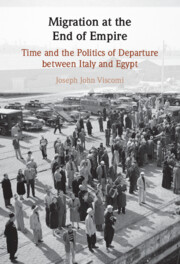
- Publisher:
- Cambridge University Press
- Online publication date:
- May 2024
- Print publication year:
- 2024
- Online ISBN:
- 9781009473415

How has migration shaped Mediterranean history? What role did conflicting temporalities and the politics of departure play in the age of decolonisation? Using a microhistorical approach, Migration at the End of Empire explores these questions through the experiences of over 55,000 Italian subjects in Egypt during the late-nineteenth and twentieth centuries. Before 1937, Ottoman-era legal regimes fostered the coupling of nationalism and imperialism among Italians in Egypt, particularly as the fascist government sought to revive the myth of Mare Nostrum. With decolonisation, however, Italians began abandoning Egypt en masse. By 1960, over 40,000 had deserted Egypt; some as 'emigrants', others as 'repatriates', and still others as 'national refugees'. The departed community became an emblem around which political actors in post-colonial Italy and Egypt forged new ties. These anticipated, actual, and remembered departures are at the heart of this book's ambition to rethink European and Mediterranean periodisation.
‘Drawing on an impressive range of sources and historical methods, Joseph Viscomi’s beautifully written book on the Italian community in Egypt and its departure weaves larger claims into a fine-grained narrative, inspiring important and timely reflections on belonging, extraterritoriality and temporality in the Eastern Mediterranean.’
Valeska Huber - author of Channelling Mobilities: Migration and Globalisation in the Suez Canal Region and Beyond, 1869–1914
‘Joseph Viscomi’s important book recasts the history of Italians in Egypt by analysing the relationship and tensions between historical temporalities and political membership from the nineteenth century until the present. A profound, sophisticated and meticulously researched work, this book will be necessary reading for anybody interested in Mediterranean history and its multiple landscapes of migration.’
Ilham Khuri-Makdisi - author of The Eastern Mediterranean and the Making of Global Radicalism, 1860–1914
‘This book is a time-machine - a fascinating journey into the imaginaries of post-imperial migrant temporality - elegantly told, polyphonic and timely. Viscomi makes us understand the contemporary Mediterranean from a long-term perspective. An eminent contribution to the transnational history of Italy, to the history of modern temporality and migration studies.’
Manuel Borutta - co-author, with Sakis Gekas, of A Colonial Sea: The Mediterranean, 1798–1956
 Loading metrics...
Loading metrics...
* Views captured on Cambridge Core between #date#. This data will be updated every 24 hours.
Usage data cannot currently be displayed.